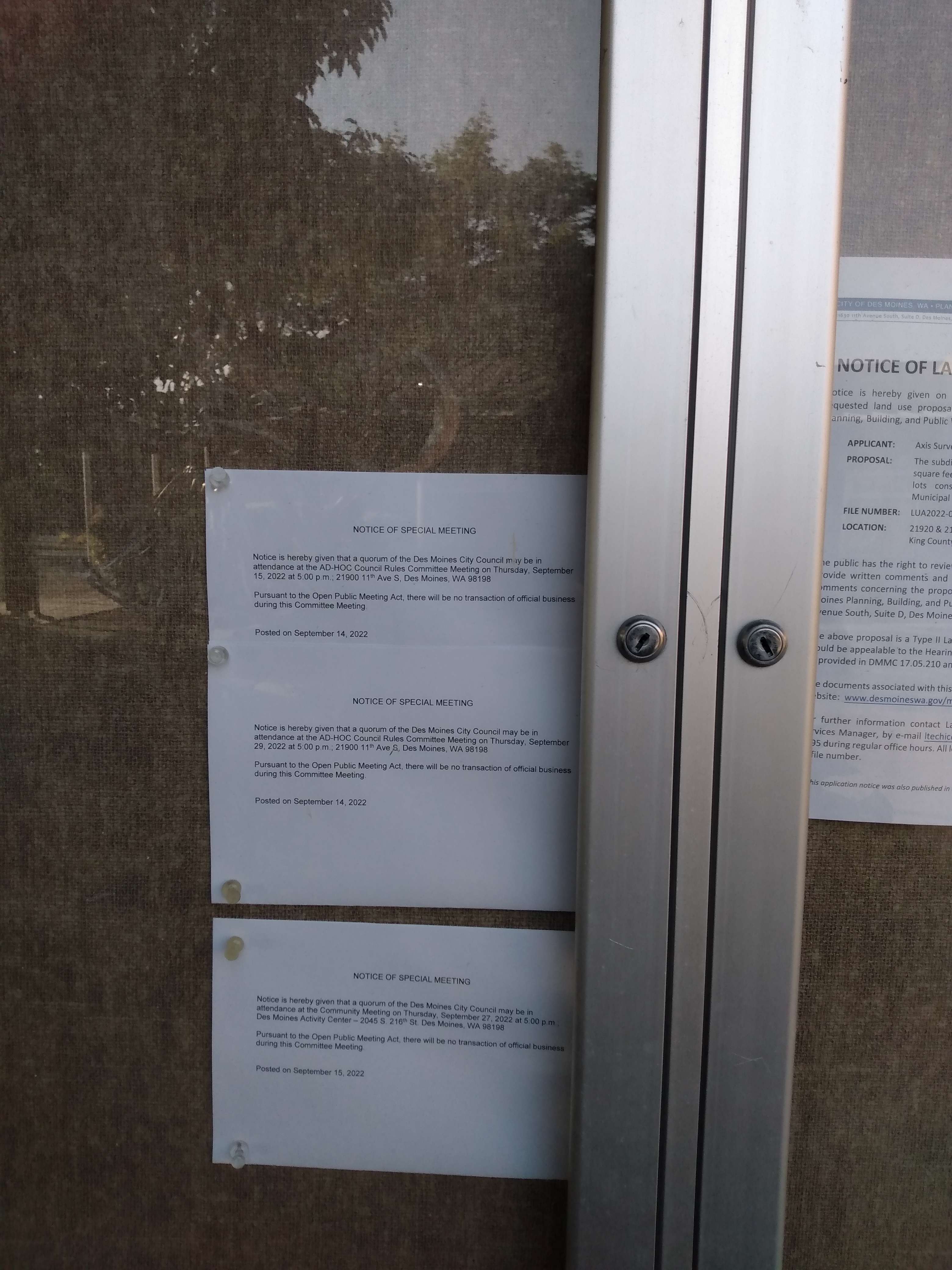
Intro
Fair warning: All is true, but I walked into this with a chip on my shoulder. Because:
- The meeting was held with the bare minimum 24 hours legal notice.
- At a non-standard location (Police Station)
- Was not recorded.
- Did not show up on my City Calendar like other committee meetings.
- There was nothing on the web except one tiny marker on the City web site.
- And even little details like wi-fi were challenging.
The notice on the door indicated that there might be a ‘quorum’. Four people showed up, all from Redondo, including Councilmember Achziger. I assume they found out about it from either he or moi.
Back in time…
When the Council voted for some form of update to our Rules back in July, Deputy Mayor gave a presentation. I asked for a one-sheet specific task list. Because when we leave things open-ended (and we always leave things that open-ended) something bad always happens. It’s designed that way.
Buxton: My view of an ad hoc committee is administrative in mostly administrative like to gather information organize it and for me put everybody's input into a draft... Mahoney: I would i would just say that this is the purpose of this is administrative, to get us ready to have that meeting in a constructive format where everybody's had input. So essentially the meetings that would occur in November and December would attend. It would essentially achieve that everybody's input would be there but it would be formatted and ready for the discussion any any subsequent meetings before that... Harris: Having done this for a little while now and been kind of been a sap, I am going to recommend to my colleagues that the deputy mayor prepare a written proposal with a specific process bring it back at the next meeting and then we amend it and pass that. We've had this history of doing this kind of ad hoc, from the dais, sloppy business. And one person's understanding is this or that. You want a piece of paper. One page... Pennington: I don't know that any one of us have that kind of expertise or time... Harris: I made the motion because i have every confidence in the deputy mayor's ability to prepare a parliamentary procedure that is accurate and would be for the good of the council. And on one page.
That motion failed 2-5. No one spoke on my behalf.
The funny thing is that if you look at the Agenda, we were given two options to vote on, a ‘tweak’ or ‘complete re-write’. We never even voted on that. We just voted for… er… ‘something’.
All I took away from the above was that ‘we’ had decided to hire a consultant who would interview each of us as to our needs, wants desires. The consultant would compile those together, then submit a report. And then the committee would convene, discuss those ideas, and submit a draft to the full Council for debate.
As I said, I’ve been through this before. And yeah, that’s not what happened.
On the plus side, apparently, we have hired a consultant, Ann McFarlane of Jurassic Parliament, with whom I have taken several classes on various aspects of parliamentary procedure. I’ve also posted articles of hers here many times.
On the minus side, the committee (of which Deputy Mayor Buxton was named chair) showed up to the meeting having already developed a draft proposal, but before gathering that individual input. So whatever concerns CM Pennington may have had regarding anyone’s lack of time or organisational skills seem to have been misplaced.
In fact, during the meeting they were very pleased with their progress, seeming to have gone through about reviewing two thirds of that first draft.
You can stop right there.
In my opinion, that right there is, unethical and shows such bad faith as to be considered corruption. And if it had been recorded, I would’ve just walked out. There wasn’t even the pretense as to good faith.
Let’s start over…
Again, this is not a series of tweaks. It is a full re-write being done by the committee before it is even seen by the rest of the Council or the consultant and that is not what the Council discussed or voted on.
Over our history, our Rules of Procedure have slowly evolved from a standard template of language provided by the State of Washington for cities like ours. We’re referred to as ‘Code Cities’ because we adopted that State’s template of ‘code’. And every few years we amended that template.
The members had already spoken among themselves in private and developed a work plan. Rather than simply amending the existing Rules of Procedure as we have every time in the past, they decided to do a complete re-write based on two cities they apparently found attractive. Bothell and Kirkland.
Non-decision
And regarding that consultant, as much as I admire Ms. McFarland, our City Council has never before felt it necessary to retain a ‘consultant’. Deputy Mayor Buxton could have used her obvious vast store of energy and saved the taxpayers a few bucks on yet another ‘consulting fee’. And when I said that ‘the Council decided’ to hire her, actually City Manager Matthias says in the video that he had already researched hiring a consultant ahead of the meeting. So we really didn’t ‘decide’ anything, of course.
Side by side…
To give you a sense of why this bugs me so much… here is the table of contents and one page from our current rules concerning the role of presiding officer (Mayor). We have thirty seven rules and the whole thing takes up thirty three pages.
Now, here is a similar TOC and page describing the role of Mayor (presiding officer) from Kirkland. It has twenty five pages, but is subdivided into fifty five ‘rules’:
Looks easier, right? Sure. To you. But it functions exactly like our current system, which we already know how to navigate. And (sorry) it wasn’t meant for you. So again, the committee was starting from scratch, with two new documents, which do the same things, but are now formatted in a radically different manner. They were cutting and pasting large sections of each of these together before even sitting down?
Why forms don’t change…
Think about your 1040 tax form for a minute. Sure, it could be designed to be easier. But one reason it stays the same is because familiarity is a very good thing with legal documents.
Every year your accountant only goes over changes that might affect you. You expect the 1040 to look (mostly) the same every year. That allows you to focus only on the differences. That is also how the law works. You don’t generally scrap the entire presentation of the law. You amend it. To do otherwise would breed suspicion.
Proposing a completely new format forces any serious reader to review every frickin’ line old vs. new to make sure everyone covered all the bases.
So, far from making things ‘easier’, though the new system is meant to appear ‘friendlier’, it offers no real value. There are passages in the current RoP that could be made clearer or simplified for sure. But generally speaking, in no way is the current system difficult to understand. In fact, it’s waaaaaaaaaaaaaay simpler than most of the 1040EZ. Frankly, anyone who has real difficulty in navigating the current RoP, probably should not run for City Council.
And also, though they are a Public Committee of the Council, they provided none of the materials they were working from. So even if the public had shown up, it would’ve been impossible for them to follow along.
The process
As I wrote, the members mentioned in passing having looked at RoP from various ten other cities, but only Vancouver and SeaTac were mentioned by name and none of their code was used in the discussion. (Although they failed to mention the examples I submitted for some reason. 😀 )
So, they worked from that draft–going section by section through whole sections copied from Bothell and Kirkland. They mentioned sections they liked as being in blue? Sections they didn’t were in red? Sections they thought were ‘unneeded’ were simply cut out (eg. a travel budget, which many other cities do have, btw.) That was a theme: if there was something in those cities’ RoP that we do not currently have but which they did not appreciate, they didn’t say, “I know some people want to discuss that!” They simply cut it.
When they got to bits where they thought there might be hard opposition, they would say things like “that will be a discussion”, marked it off as such and then moved on.
At the tail end of the meeting a lot of the meeting was spent using the word ‘sanctions’. Basically, how to make the rules have some form of enforcement component.
Efficiency
By having what was essentially a private draft worked out in advance, they were, by their own able to get through about two thirds of their work in two hours. Woo hoo!
Left for next time? The apparently thorny subjects of ‘social media’ and ‘conflict of interest.’
Let’s talk about Bothell and Kirkland
I love Bothell. I was married off of Juanita Bay (which is technically Kirland? 😀 ) Hi there, Kirkland City Council! But those two cities are part of the North Shore School District, which includes Woodinville. Let’s just say that the (cough) demographics, challenges, and just about everything are slightly different from Des Moines. 😀
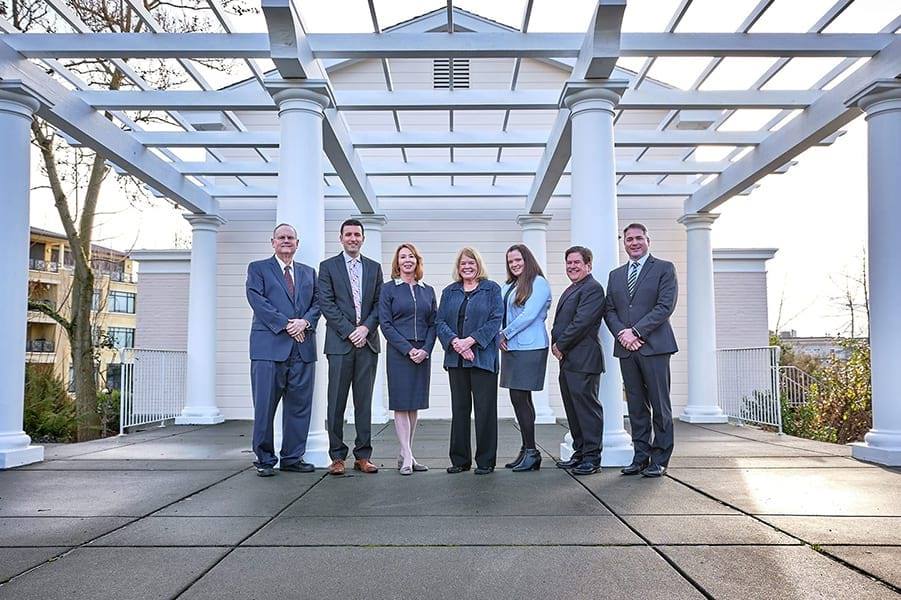 I’m sure both cities are doing great things and I mean that literally. Bothell and Kirkland have over twice the budget we do. (Long time watchers of our City Council meetings may remember Bothell because Traci Buxton has used them three times over the years as an example during salaries bumps for our City Manager. At last check, the Bothell guy was the highest paid City Manager in WA. And if we had as much money as either of these two cities, I’d be more inclined to think that appropriate as well.)
I’m sure both cities are doing great things and I mean that literally. Bothell and Kirkland have over twice the budget we do. (Long time watchers of our City Council meetings may remember Bothell because Traci Buxton has used them three times over the years as an example during salaries bumps for our City Manager. At last check, the Bothell guy was the highest paid City Manager in WA. And if we had as much money as either of these two cities, I’d be more inclined to think that appropriate as well.)
Why we would choose to use cities so different from ours as a model for either salaries or our RoP on escapes me. Perhaps those are the Cities my colleagues wish we could be.
Highlights
Spending Authority
All three agreed on the notion of raising the City Manager’s spending authority from $50,000 to $100,000, apparently to account for something ‘inflation’? Again, if we had twice the budget, I might be more amenable to twice the spending authority.
Appointments
They acknowledge that our Mayor has not always been using the proper procedure for appointments. So they seemed to indicate a willingness to just codify this de facto practice as the new rule. This doesn’t kill me because:
- Just look at our current assignments, which are solely and arbitrarily at the whim of the Mayor. He assigned himself to ten things, the Deputy Mayor to a dozen things, removed me from assignments during the term, and even invented assignments without a vote of the Council–in direct violation not of our RoP, but of the City Municipal Code.
- I’ve also registered at least a dozen complaints from residents who applied for various advisory positions and found the whole thing to be a black box. To which I reply, “Welcome to my world.” 😀
Two years to be mayor
One rule that has been controversial is the requirement that one must serve for two years to be eligible to be mayor or deputy mayor. All three members agreed that that this should be retained. Mahoney: “When I got started I didn’t know anything.”
I could not agree more. No matter what you think you know going in, it does take two years to understand what’s going on, let alone to do a fair job as Mayor. Without that experience, you are simply at the mercy of staff guidance. And no matter how helpful they are, that prevents one from maintaining the proper professional distance.
Councilmember Steinmetz has criticised me for not feeling he belonged on this one particular committee and this is exactly why. No matter how many games you’ve watched, it would be inappropriate having someone make rules about baseball until they had actually spent some time on the field.
Business Owners
Everyone felt that it was important to clear up any confusion as to the role business owners have on committees like the Lodging Tax Committee. The feeling seemed to be that since they generate business they should be in control.
I disagree completely. I believe that no City board/committee should ever be controlled by people who are not residents of Des Moines. Of course business owners should be a strong component of all relevant advisory groups; but never the controlling interest.
Sanctions
- The committee spent a lot of time discussing ‘sanctions’ and ‘punishment’.
- They also talked about having Councilmembers sign some form of ‘contract’ after being elected–agreeing to abide by the Rules of Procedure.
- A ‘three step process’ was mentioned.
Councilmember Steinmetz mentioned the possibility of conducting a ‘sanction’ process in Executive Session. And for the uninitiated, Executive Session means in private. Nothing from Executive Session may be recorded or even discussed in public.
1And here’s the best part: Under state law you’re never allowed to tell people anything as to what just occurred behind the curtain. Ever. You’re not even required to provide Minutes if you don’t want to. ES is the exact opposite of accountability and transparency.
In the past, the only time there has been an Executive Session here concerning an elected was when an elected was involved in litigation that might involve the City (eg. Don Wasson, ca. 2003.) There was no ES during the Anthony Martinelli kerfuffle because legally speaking his personal issues did not affect the conduct of City business.
This will be interesting.
Better…
For those of you who will complain ‘fake news!’? Fine. Show up at the next one, which is September 29 at 5:00PM. I told you that, they didn’t. Listen for yourself. Demand a recording. Prove me wrong; or over the top; or a complete fabulist.
This is my opinion (one of the rule changes the committee seems to want is that one provide an explicit disclaimer at all times)
The word ‘better’ was mentioned many, many times without defining what that means.
The RoPs in Bothell and Kirkland may appear more user-friendly, but ‘user-friendly’ was never our problem so I don’t see that change as ‘better’ or even ‘necessary’. I see it as taking time.
But the discussion I heard did nothing to address my definitions of ‘better’. Which are:
- Transparency
- Access to information
- Accountability
- Outreach, both to the public and to members of the Council.
Regardless of any personal animus, these changes will affect every new Councilmember going forward. It will create a new ceiling as to what is possible here, using two very different cities as the model. Candidates will fool themselves into thinking, “Oh, I’ll be nicer. It won’t be a problem for me.” That. Does. Not. Happen.
Be careful…
As I said, without any specifics, the City of SeaTac was mentioned in passing. Like Bothell and Kirkland, SeaTac’s budget is also at least twice our size. But their RoP does address many of my concerns. And many of those improvements were made in the past five or six years, by a Council with very different politics. Which only goes to show that good government is not about ideology. Ironically, it is exactly as Deputy Mayor Buxton said in her opening remarks. It all comes down to one’s ethics.
But that’s a conundrum that more than one CM has expressed to me in private over the years. By implementing processes like a right to inquiry and providing more public access to meetings and town halls, the prior SeaTac Council helped contribute to the recent change in their Council majority.
In other words, if you work to make your government truly more transparent, accountable and inclusive you make it easier to be replaced.





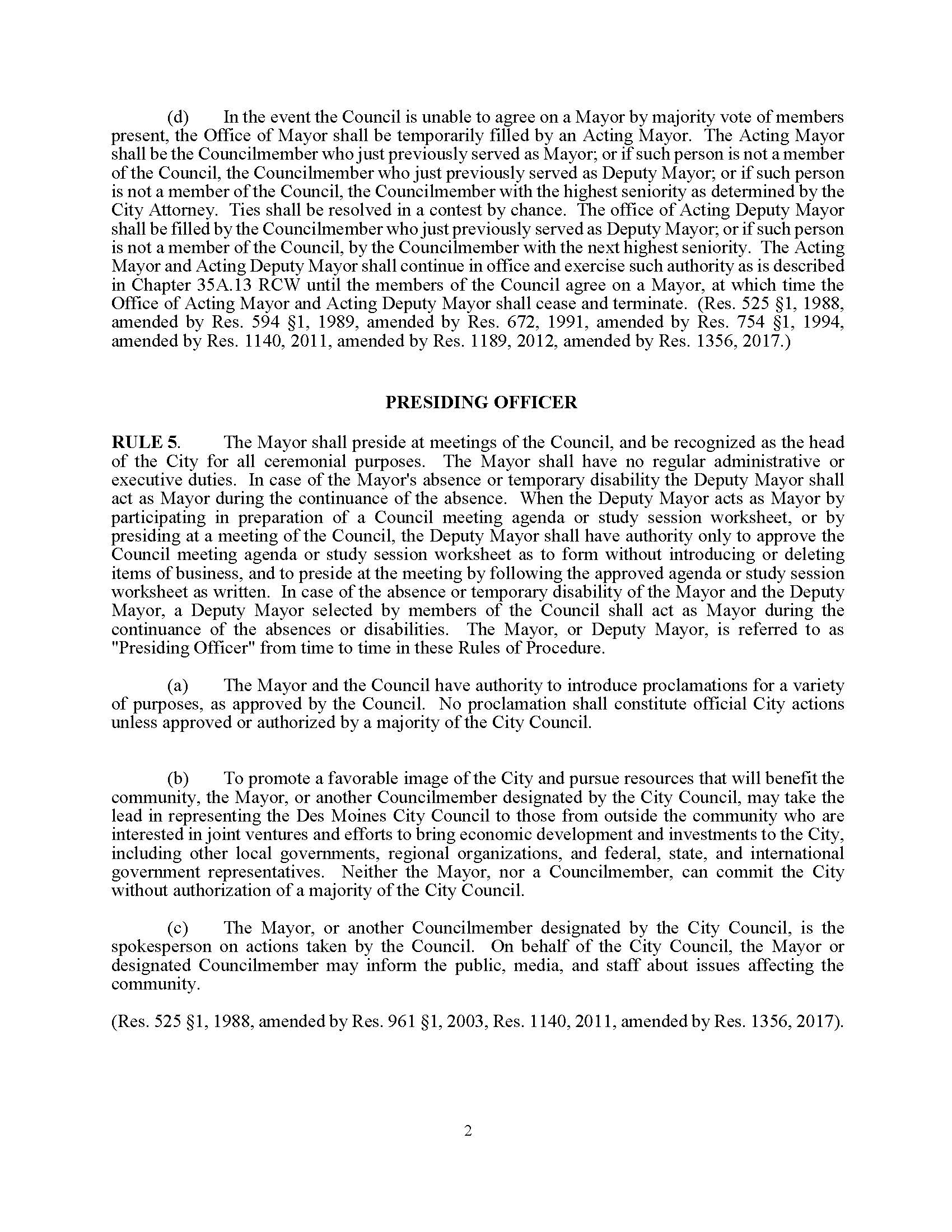
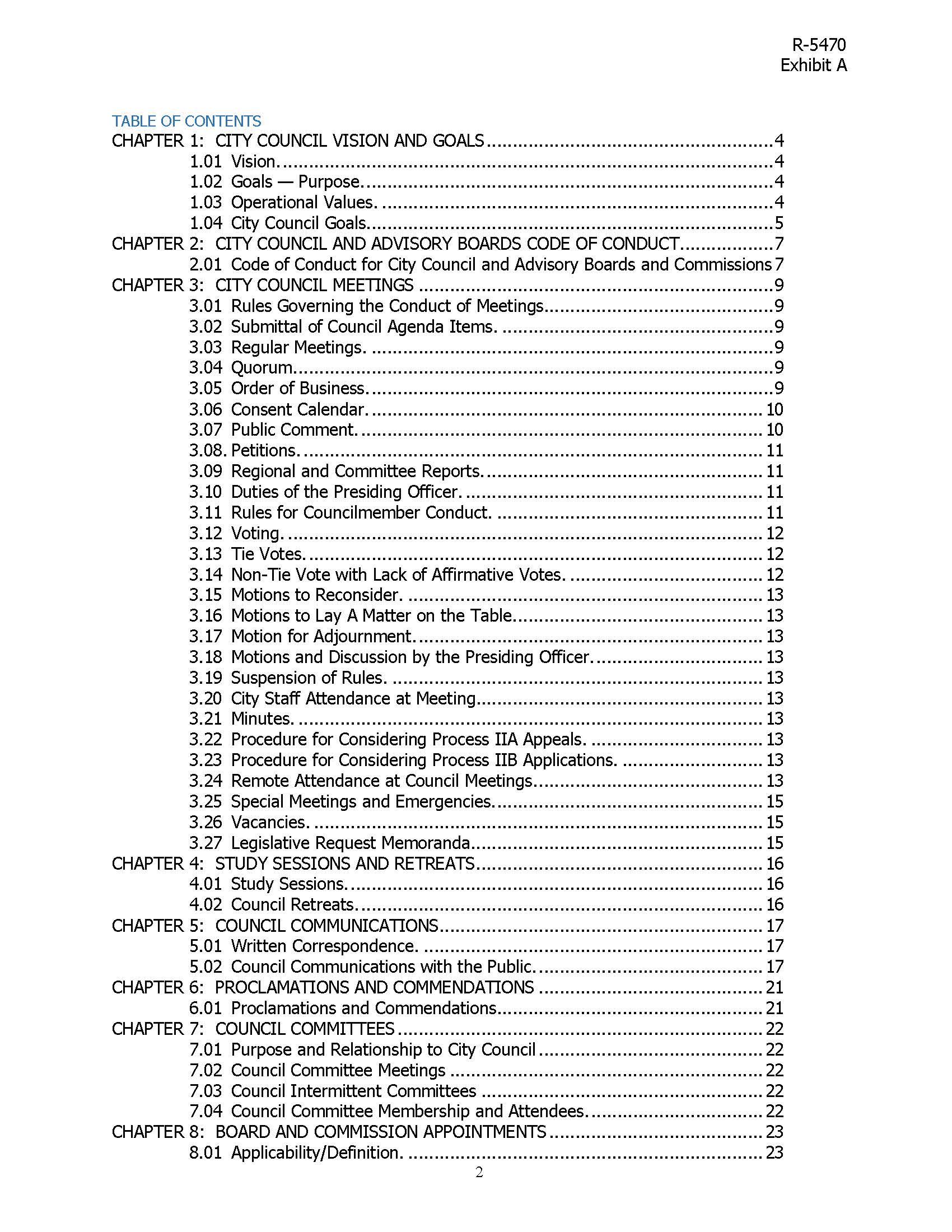
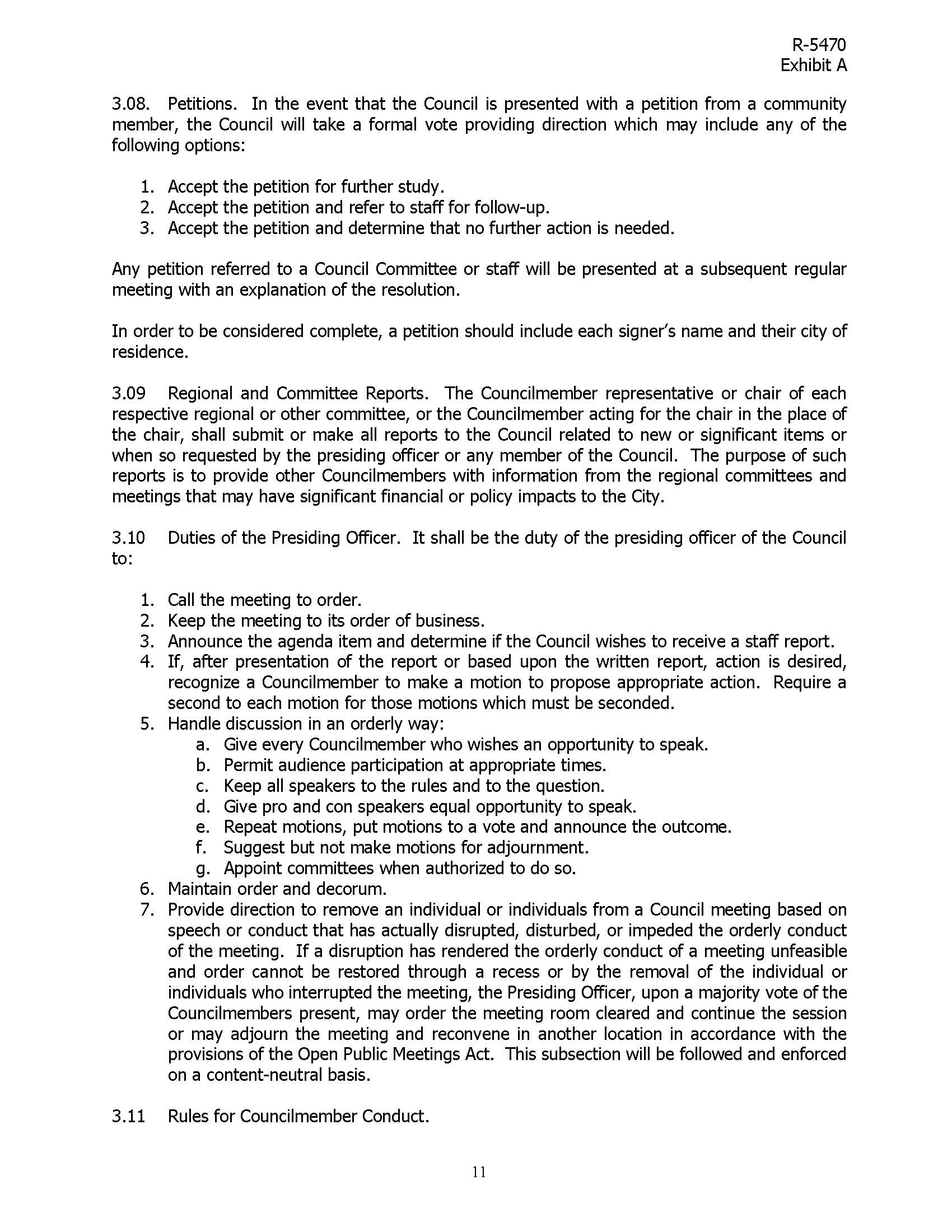
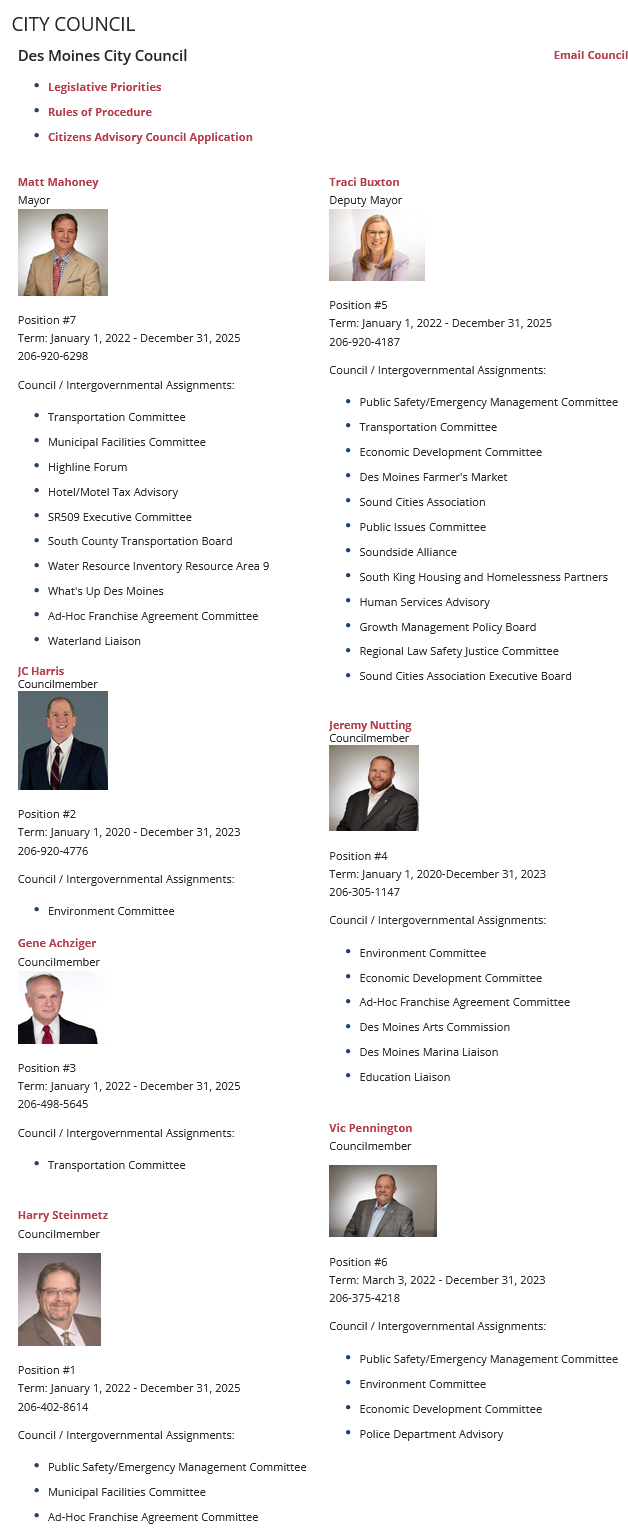
Comments
Comments are closed.